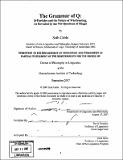The grammar of Q : Q-particles and the nature of Wh-fronting, as revealed by the Wh-questions of Tlingit
Author(s)
Cable, Seth
DownloadFull printable version (29.90Mb)
Alternative title
Q-particles and the nature of Wh-fronting, as revealed by the Wh-questions of Tlingit
Other Contributors
Massachusetts Institute of Technology. Dept. of Linguistics and Philosophy.
Advisor
David Pesetsky.
Terms of use
Metadata
Show full item recordAbstract
The central claim of this thesis is that the agent responsible for a variety of phenomena surrounding wh-operators is not those operators themselves, but rather a distinct element that we label a 'Q(uestion)-particle'. In many languages, the Q-particle is phonologically empty, and so its role in various phenomena has not yet been recognized. Most importantly, careful study of these Q-particles reveals that the phenomenon known as 'pied-piping' does not exist, and that all putative examples of it are actually instances of normal phrasal movement of the Q-particle. This thesis starts from the demonstration that wh-fronting in Tlingit (Na-Dene; Alaska, British Columbia, Yukon) does not involve a syntactic relationship between the interrogative C and the wh-word. Rather, it involves a probe/Agree relation between C and an overt Q-particle c-commanding the wh-word. Fronting of the wh-word in Tlingit wh-questions is a mere by-product of fronting the projection of the Q-particle. From this core observation, a syntax and semantics for Tlingit wh-questions is developed. Given the strong similarity between the wh-constructions of Tlingit and those of more widely studied languages, the analysis developed for Tlingit is then applied to a range of other languages. It is found that such a 'Q-based' theory of wh-constructions holds a variety of analytic consequences. Regarding so-called 'pied-piping structures', the Q-based theory provides an analysis of such structures where the very concept of 'pied-piping' is eliminated from the theory of grammar. Furthermore, the Q-based theory provides a semantics for wh-questions that correctly interprets pied-piping structures without recourse to any mechanisms beyond those needed for wh-questions without pied-piping. (cont.) Finally, the Q-based theory accounts for various constraints on pied-piping, and correctly predicts the scope and limits of its variation across languages. Beyond its treatment of pied-piping, the Q-based theory also provides a novel syntax and semantics for multiple wh-questions, which successfully ties the presence of Superiority Effects to the absence of Intervention Effects, and which correctly predicts a previously unnoticed Intervention Effect in English. Moreover, it provides a novel, unified account of the ill-formedness of left branch extractions, as well as of preposition stranding.
Description
Thesis (Ph. D.)--Massachusetts Institute of Technology, Dept. of Linguistics and Philosophy, 2007. Includes bibliographical references (p. 381-398).
Date issued
2007Department
Massachusetts Institute of Technology. Department of Linguistics and PhilosophyPublisher
Massachusetts Institute of Technology
Keywords
Linguistics and Philosophy.